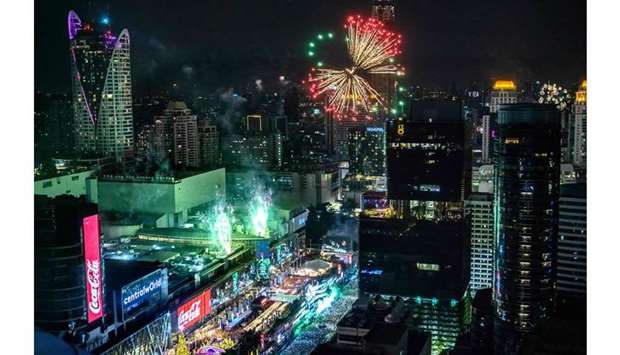By Kamran Rehmat
There are multiple engaging areas and aspects to a familiarisation trip such as one to Thailand, but each time you realise one is not enough. ‘The Land of Smiles’ — as it is popularly known — immediately strikes you as (why it is) one of the world’s premier tourist destinations even if you have not been here before. But if you have, chances are you just take it for granted. Because somehow they have managed to whittle it down to a simple enough equation: smile = happy tourist.
The figures speak for themselves: 2020 marks the 60th anniversary of the Tourism Authority of Thailand and Thai Airways International — the pillars of Thai tourism. Today, the kingdom enjoys 40 million arrivals and 3 trillion bhats in income according to Imtiaz Muqbil, Executive Editor of Travel Impact Newswire, Thailand’s second longest serving travel trade journalist, and author of The Greatest Story in Global Tourism History.
That being said, just pigeonholing it in one (admittedly, massive) area would be a tad one-dimensional — even unfair — given how rich the tapestry is. But let’s start with the smiles anyway. In moments of solitude, one has often wondered how Thais manage to keep that emoticon-like spread regardless of how tough life is — and it always is, in some part of this cinder of a planet!
The standard outsider explanation, of course, redounds to “laughing all the way to the bank”. But that, in my considered opinion, is a rather lazy inference with a pronounced business rider. It does not take into account what lies beneath that effusive smile. Could this simply be a natural byproduct of religion, culture, values? I had this engaging casual conversation with a senior Thai official, who, agreed with me on those derivatives as well as the calm and serenity one had experienced in another predominantly Buddhist nation — Sri Lanka — as an expat resident. But he told me how it was also viewed as a “weakness” by a few, who deduced that the Thais were “too soft” — as a people and country. At the end of this conversation, one just opined how the world would be a much better place if there were similarly other “soft” nations.
Consider. Thailand is now exporting ‘Sufficiency Economy Philosophy (SEP)’ in a conscientious endeavour to help other nations achieve sustainable development goals! At a Ministry of Foreign Affairs press briefing in Bangkok, its finer details were shared with our media group from the Middle East. In fact, Saowalak Pornwilassiri, of the Department of South Asia, African and Middle East Affairs, disclosed that Thai diplomatic missions abroad had a new mandate vis-à-vis SEP.
Fresh from leading the Asean with panache as its chair last year, Thailand is swearing by the uncanny scruples of taking every willing partner along on a journey for collective rewards.
When this scribe asked about the ‘novelty factor’ in passing the ingredients of success to other nations with the possibility that they may go on to rise as similar powers or even better, she reasoned that ultimately, it benefited humanity and that was the only motivating goal for Bangkok in proactively helping other capitals. If nothing else, it surely is a recipe for winning friends and perhaps influencing people (Dale Carnegie, anyone?) swiftly!
Natapanu Nopakun, Deputy Director General, Department of Information, Ministry of Foreign Affairs, said the tour was part of a studied endeavour to familiarise media professionals with the diversity of Thailand. In this regard, he highlighted the economic vistas and tourism (including medical tourism, which also makes the country a choice destination), but with a greater emphasis on ‘sustainable development’, which he drove home was entirely homegrown in Thailand’s case.
It was a recurring theme throughout the tour and Assistant Professor Dr Molraudee Saratun of the Sustainable Development and Sufficiency Economy, Studies Center, National Institute of Development Administration (NIDA), painstakingly explained the philosophy that has enabled Thailand to become the success story it is today and how it was trying to fashion the same elsewhere with a profound commitment.
In a frank exchange where a figure of $63 billion turnover was trotted out for the last year, Nopakun said that while tourism had been pivotal in making Thailand a hub, the country believed in — and practised — responsibility to ecology.
“We believe in maintaining a fine balance; we offer value for money, but money on its own is not our goal. (Hence) our tourism is not only for the rich indulging in luxury, but it caters to all tiers where the prime goal is to maintain environment-friendly tourism. We don’t aspire for too many just to make more money. It is important to maintain eco-friendly tourism and sustain all good practices,” he pointed out.
Perhaps, the spirit was encapsulated none better than by this inscription on a signpost one saw:
“We are supposed to plant a tree in the people’s heart and those people will plant tree in the land”— King Bhumibol Adulyadej (Rama IX)
Over the years, Thailand has developed indigenous marketing schemes to promote tourism and it has also been creative in using tourism as a bridge to enhance diplomatic relations. However, late King Bhumibol inspired the development of sustainable tourism by empowering local communities as well as preserving the environment and natural resources (in the round-up that follows on the select few sites this scribe visited, this is a central theme of Thailand’s green outlook).
Islam in Thailand: A look at history
and the burgeoning Halal industry
Thailand, a predominantly Buddhist nation, has been for some time now, a go-to destination for even people of other faiths particularly, Muslims, from the Middle East, and closer home, the GCC. In fact, it is already the top ranked destination in Asia for Muslims. The reason is not hard to understand. It has also evolved into a dedicated tourism industry catering to the Islamic faith: from running halal hotels and food to the many places of worship that enable Muslims to have a relaxed vacation.
Similarly, patients coming from the Middle East and GCC have been benefiting from medical tourism in completely safe and secure environs with dedicated help right from native language communication tools to treatment and post- treatment stay in the country, and resultant follow-ups.
Associate Professor Dr Pakorn Priyakorn, Chairman of the International Task Force, Office of the Sheikhul Islam of Thailand, was at hand to give the media a detailed presentation on his behalf and answer questions related to various issues falling under the subject.
Going back in time, he said, historically, politically and culturally, Muslims have been an integral part of the social and economic development of Thailand for nearly five centuries. Islam is the second biggest religion in the kingdom and enjoys royal and official patronage. Muslims number approximately 5.9 million. He felt that part of the Thai success story was owed to peaceful coexistence by intent. The Sheikhul Islam was first established and appointed by King Songtham in 1602 AD. Islam is the dominant religion in four southernmost provinces. He disclosed that there were nearly 4,000 mosques in the country, and 185 of these were in Bangkok alone.
But none of this backgrounder would be complete with a word on halal food. Coined as ‘Kitchen of The World’ since 2000, Thailand is one of the world’s top 10 Halal food exporting countries and all this is owed to an elaborate paraphernalia manned and overseen by Muslim researchers and food inspectors in a detailed set-up.
Dr Priyakorn, who is also Director, The Halal Standards Institute of Thailand, ran a documentary on the subject to enlighten the visitors on how — and what — Thailand manages to dutifully respond to the need for Muslims to lead their lives in conjunction with Islam where halal food is concerned.
Thailand’s status in the Muslim world is also embellished by the fact that it also enjoys Observer Status in the 57-member Organisation of Islamic Co-operation.

CELEBRATIONS: Fireworks erupt over downtown Bangkok during New Year’s celebrations on January 1, 2020. AFP

